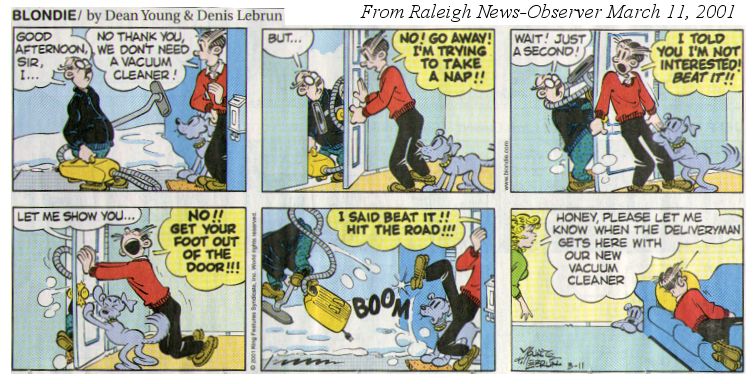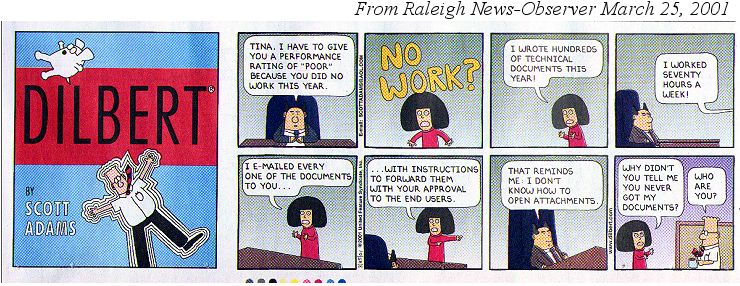
This month's newsletter will be quite short -- and, May's newsletter will not be available until mid-May.
I encourage you to browse earlier SCScompA newsletters if you have not already done so, and to send me any comments/questions/concerns that you may have regarding material presented in these newsletters.
First, another couple of comics from this month. The examples show the result of scanning the comics, moving the scanned image to the Web, and then showing the image as follows. I hope you are taking the advantage of your home computer system's scanner if you have one and sharing information/scanned items with other family and friends. One primary advantage of moving the information to the Web and, in turn, letting your family/friends know the address of the Web information is the friends/family can easily take a look at what you have scanned/placed there at their own convenience. This is sometimes easier/more "polite" than sending them attached documents/pictures.
Yes, you would no doubt use the approach for better uses than comics! However, for examples, sake: Read on.
I guess we each have been involved in similar situations sometimes in our lives/careers.


In many cases, improving our communication efforts may prove to be a valuable step to take.
I hope you have a good month of using -- and, I wish you have continued success with -- your home computing systems.
Contact me regarding any matter in this newsletter that causes you concern or you want to otherwise discuss.
Regards,
Dave Shogren
eMail to: SCScompA@aol.com
---------------
A Few Comments Related to Recent Use of America Online |
Contact SCScompA regarding the above discussion: I am interested in your comments and in knowing if the topic fits your needs. |
This Month's Example of Viewing Scanned and/or Digital Camera Pictures using HTM (Web page) parameters. |
|
In many of my newsletters, I show a few examples of using an HTM-type approach at sharing photographs or other material including scanned images with family/friends. To see this month's example click on: This Month's Photograph Examples from SCScompA.
-----------------------------------------------------------------
Don't hesitate to contact scscompa@aol.com with any comments on the above or for any related discussion. |
Miscellaneous Comments Regarding Home Computer Use Matters that Came Up in March |
|
|
Contact SCScompA if you have any comments or questions about the above. |
Freecell Game/Deal of the Month
|
|
We continue, in our household, doing Freecell deals from 1-to-32000! We will NOT accomplish this task. We know that. However, as we go along in our for-fun-effort, yet frustration... I will mention once in awhile specific Freecell deals we find challenging.
Note: If you are running your PC on Windows 98, it is possible you have to specifically install Freecell. Just install Accessories/Games. Let me know if this Freecell game and the number of times we had to restart to solve the deal is about what you find. If you are going to attack deals 1-to-32000 and want to interact with us in that regard, let me know what thousand-or-so you are going to start with. We have completed deals through 1200. Now, we are attacking 1001-to-2000 and I would recommend you start with 2001! At the rate we are going (a little more than 100 deals a month) it will only take us 24 more years to complete the 32000 deals without your help. If you let us know what you have completed, it will take us less time! I am adding to this column in the newsletter a few "easy" games that we found during the month.
Deals we completed in one start and view as "easy"-but-still-fun games this month:
Other deals we found interesting-and-not-too-hard this month (number of times to restart is in parentheses):
A different type of deal was: Let me know how YOU do! If you want to see our list of Freecell Deals 1-thru-what we are working on now and our comments on how many times we had to restart the deal to find a solution, let me know -- or click on: SCScompA Freecell Table of Completed Deals
|
Or send snail-mail to:
SCScompA
P.O. Box 58223
Raleigh NC 27658
USA
------------------------------
Use your Web browser's Back button or to go to SCScompA's main Web page and other newsletters, click on: SCScompA main web page or go to any of the pages pointed to in the SCScompA frame at the left of this panel.